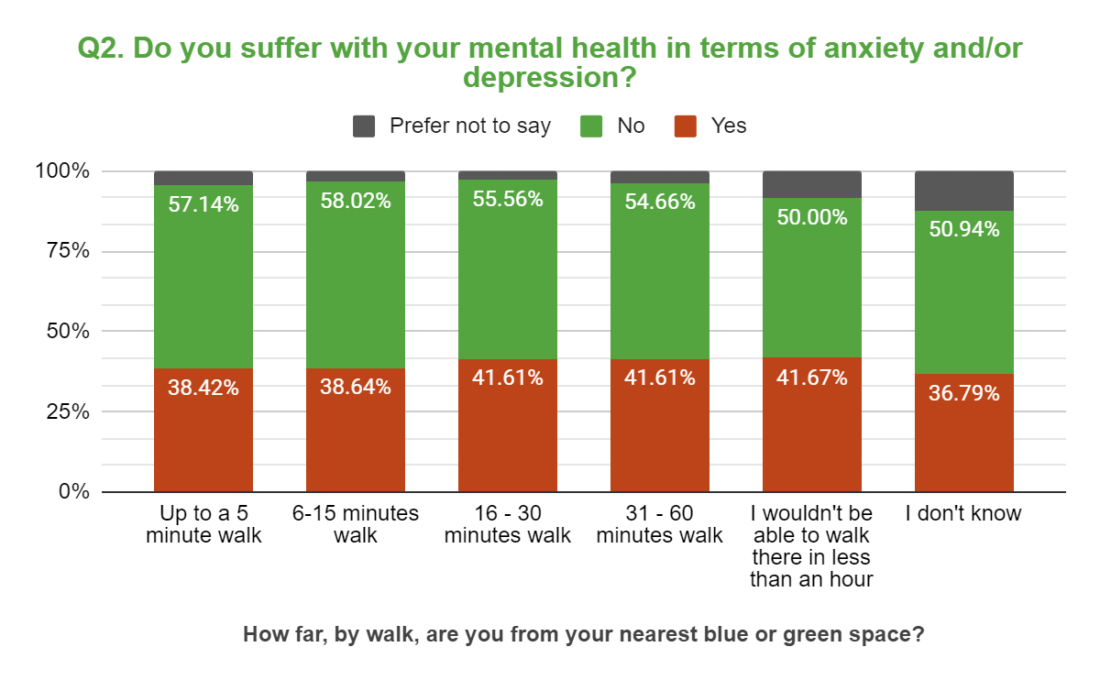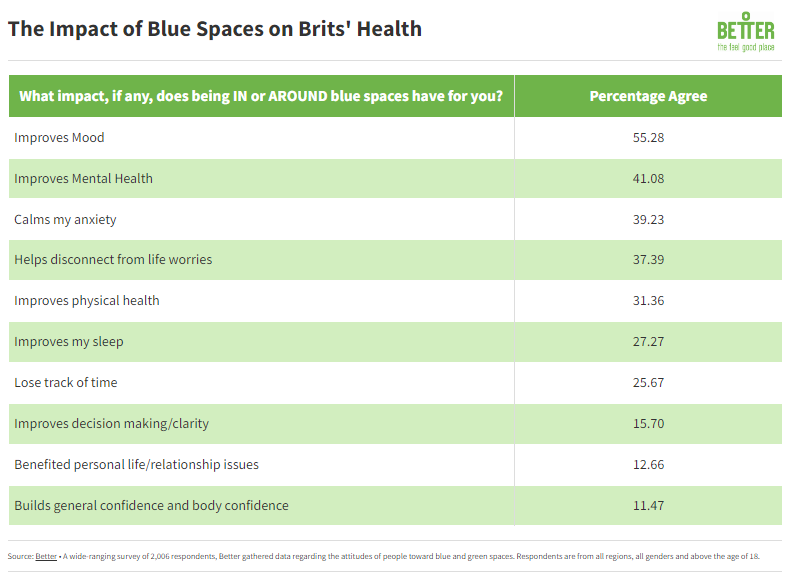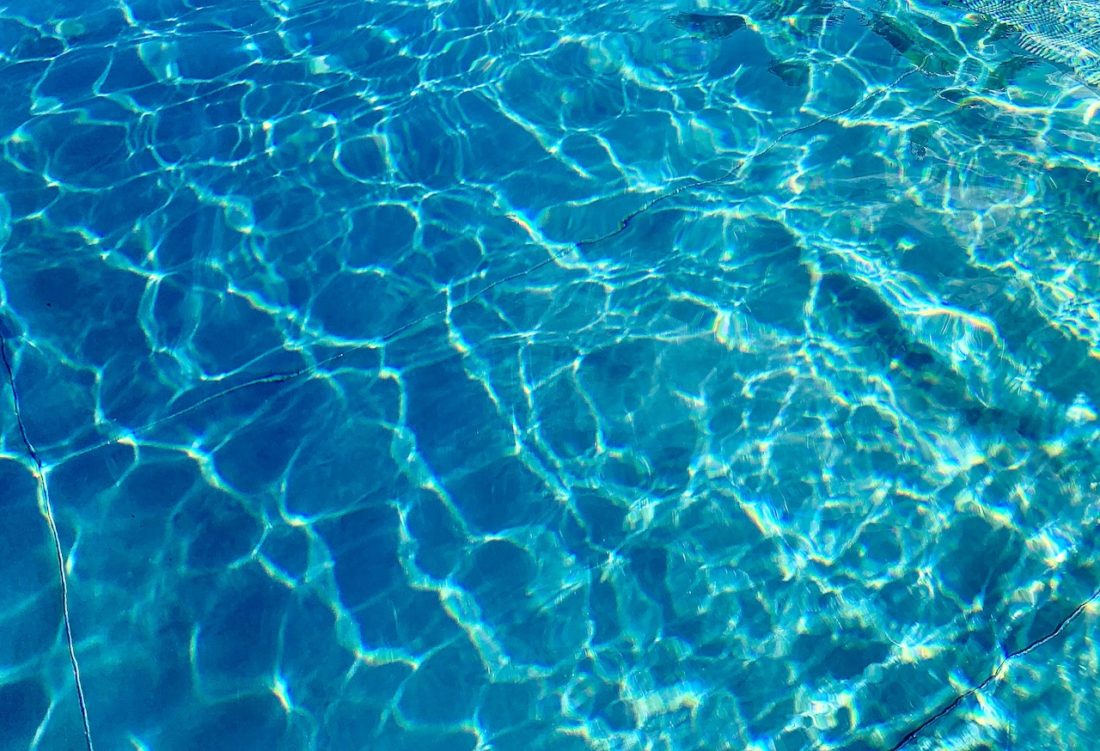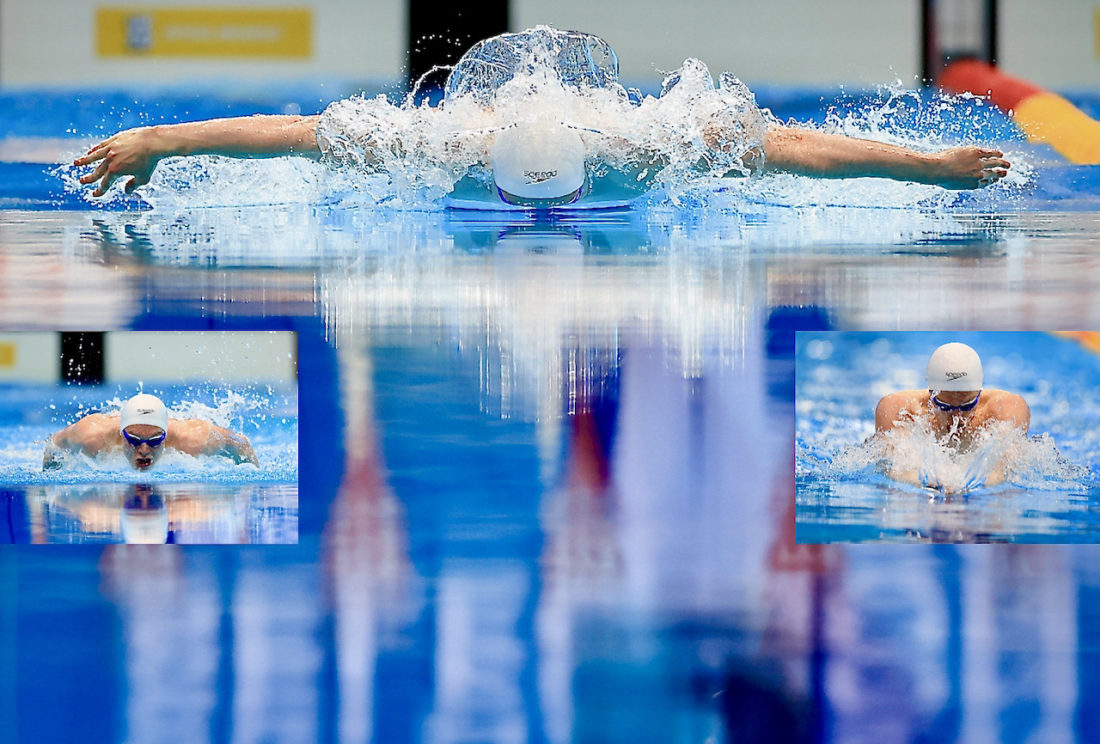Water = Better Mental Health (& Community Cohesion) But 37% Quit Regular Swim In Cost-of-Living Crisis – Survey

A new study has revealed that 37% of respondents to a UK survey have stopped swimming regularly due to the cost of living crisis, even though 89% of Brits feel positive benefits being near water, whether that is improving their mental health, lifting their mood, or calming their anxiety.
Last month, British swimming ace Duncan Scott highlighted the benefits of swimming and sport as part of the #SaveOurPools campaign in Scotland in the midst of a UK-wide challenge to keep swimming and other sports/leisure facilities open (see foot of this file).
Research from Better, a leading UK leisure operator, suggests that 10% go as far as saying that being in or around blue spaces has benefited their personal lives and fixed relationship issues, whilst 27% say they sleep better after swimming.
Better’s findings are out today. The company surveyed 2,006 people, to highlight the importance of blue spaces in our communities at a time where local pools are feeling the squeeze. The study showed, 37% of Brits believe the cost of living is stopping them from swimming more, as well as one in five saying pool closures and cutbacks have also reduced their pool availability.
Other key takeaways from the study include:
- Over a quarter (29%) say swimming improves their mental health.
- One in ten feel happiest swimming in a pool or lido.
- Over a third demand greater investment and support for swimming pools.
The Better Findings On The Benefits Of Being Near Water & Swimming
Better sought to understand the benefits blue and green spaces have on people’s mental and physical health. It now reports that:
- 86% of the respondents said they are less than a 30 minute walk away from a blue or green space.
- 89% feel positive benefits from spending time around blue spaces.
- Two in five Brits say time in blue spaces improves their mental health.
- More than a quarter (27%) of those surveyed sleep better after time around water.
The survey released today by Better, a leading UK leisure operator, has revealed that 89% of Britons feel positive benefits being near water, whether that is improving their mental health, lifting their mood, or calming their anxiety. In fact, one in 10 Brits said being in or around blue spaces has even benefited their personal lives and even fixed relationship issues, whilst 27% said they sleep better afterwards.
Living close to a green or blue space improves mental health
With 86% of Brits saying they live less than 30 minutes away from a blue or green space, it’s clear that the UK has plenty of access to these. Less than 1% of the UK can’t walk to a blue or green space in less than an hour, and interestingly, those who lived closest to blue or green spaces suffered the least with anxiety and depression.

A quarter of Britons want to live near a blue space
Blue spaces were found to be particularly important to the UK with 55% saying that being in or around water improved their mood, and two in five stating it specifically improves their mental health (41%) and calms their anxiety (39%). The study also revealed a quarter of the UK wish they lived closer to blue spaces and a further 42% said that they actively look for a place to live by some form of water.
Over half (55%) of 16-24 year olds say they suffer from anxiety or depression.
The need for accessible blue spaces is underlined by the results showing that over half (55%) of 16-24 year olds say they suffer with mental health problems, reducing to 51% among 25-34 year olds. This halves for the 55+ age category with only 24% saying they struggle with anxiety or depression. Nevertheless the findings highlight the importance that blue and green spaces play in tackling the nation’s mental health crisis.

In fact, the research showed one in three of us feel most calm and happy when walking by a body of water, whether that be a lake, canal or the sea. This came second only to spending time with friends and family. Further recognition of the value of blue spaces came with one in 10 feeling most calm swimming, whether that be in the sea (11%) or in a pool or lido (10%). Interestingly, the UK would also rather take a nice bath over watching a TV series.
Green spaces are highly valued too with a quarter of those surveyed saying they feel most calm exploring a wood or forest, while a quarter cited visiting a park or garden (24%). One in five women are most calm when planting or gardening.
Overall spending time with family and friends was the top priority for respondents, however the 55yrs+ demographic would rather spend time by bodies of water (43%).
Better spoke to Jasmine Breaker-Rolfe, who was diagnosed with anxiety and depression at aged 14 and was prescribed exercise as way of improving her mental health:

“I had counselling and they recommended exercise to help. I was given time on a Friday morning to swim with my Auntie which really helped as it gave me time to completely zone out and have space. I always enjoyed swimming and going with my auntie to help my anxiety.
“Swimming pools are incredibly important for mental and physical health, and they also teach life saving skills to people. I would recommend swimming to anyone suffering with their mental health. It really helped.”
Jasmine Breaker-Rolfe. Photo: The Pool – by Craig Lord
The closure of pools is another aspect and impact of the cost-of-living crisis driven by Russia’s war on Ukraine, which was launched by Putin when the world was still recovering from the Covid pandemic. The IOC is currently in the eye of a storm as a result of its response to events.
Duncan Scott Urges Scottish Government To Save Pools
Last month, Olympic-champion swimmer Duncan Scott urged the Scottish government to do more to prevent the closure of leisure centres, including water spaces in various forms, from competition to learning and leisure pools.
An ambassador for the Save Our Pools campaign, Scott races the 100m freestyle, in which he was Commonwealth champion for Scotland in 2018, this morning in Sheffield at the British Championships.
A study in January showed more than 350 sports facilities in the UK had either closed altogether or reduced their offer in the past year alone.
The UK Government budgeted £63m last month to help mitigate against the damage being done by closures of sports facilities but all of that money was allocated to England. Scotland makes its own provisions in the sector.
“I’d ask the Scottish government to do the same as down south,” Scott said through Scottish Swimming. “The statistics don’t lie and I’m fully in support of the Save Our Pools campaign. I just hope the parliament and government chose to listen.
“In the grand scheme of things, elite sport is rightly a long way down the list, but it will be interesting to see what the new First Minister’s stance is on sport in general.”
Scott, the first British athlete to win four medals at a single Olympics at Tokyo 2020 in 2021, posted a video on social media in February and highlighted the vast rise in the cost of energy to maintain sports facilities, swimming pools at the high end of those costs:
In a round of media interviews via Scottish Swimming, Scott noted:

“The small leisure centres in small towns all around Scotland hold these communities together. It might not even be swimming. It could be other pool sports, small sports programmes or the centre as a whole with badminton or squash or the gym. These centres are so important – for kids, for me and you, and for the elderly. And not just for sport but for the social side too. So we have to protect them.”
“With Scotland being part of an island, it’s a life skill. We’ve got over 30,000 lochs, plus all the seas, so it’s crucial for us to learn to swim. There’s the social element as well of learning a skill when you’re young, and learning from the challenges of it, like you do in any sport.
“It’s been my whole life and it’s given me a lot of skills that I didn’t think it would, be it time-management, the challenge of integrity, things around leadership and, I guess, the financial side of it as well. What it’s given me is phenomenal.”
Duncan Scott. Photo: Duncan Scott on a medley mission – by Georgie Kerr, courtesy of British Swimming